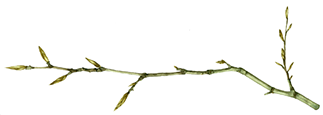Scientific Illustration: Life Cycles
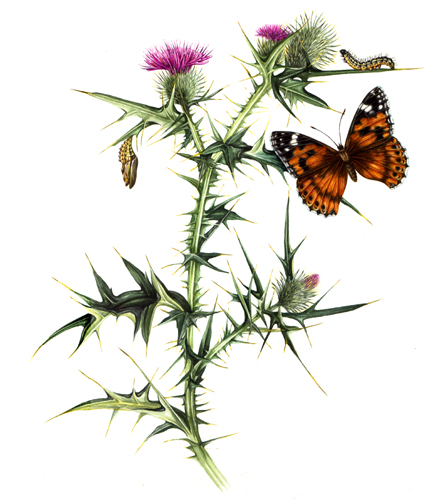
Often, commissions come in calling for a natural history illustration of entire life cycles of an animal. Although these are challenging, they’re one of my favourite jobs as it’s vital to include all the stages asked for and to make the image work well in terms of composition; a perfect blend of zoological knowledge and artistic experience.
I’m repeatedly asked for frog life cycles.
Frog Life Cycles
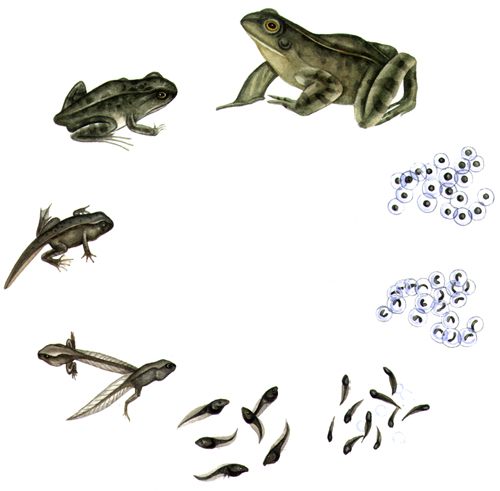
This one has been used by the Widlfowl & Wetlands Trust and was the base for the pen and ink version which I did for The Complete Naturalist by Nick Baker.
When Buckinghamshire, Berkshire and Oxford Wildlife Trust asked for a frog life cycle including background and a depiction of the mating, it was easy to re-paint the life cycle including these new components.
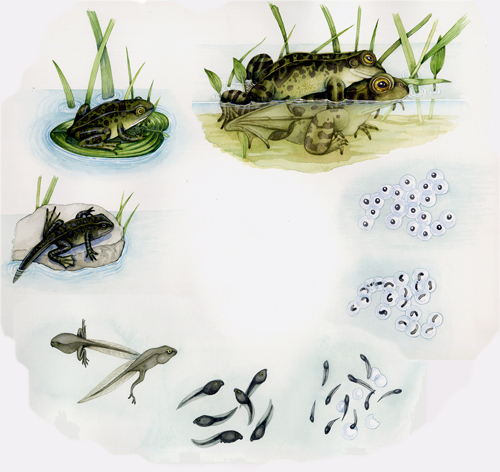
Duck life cycle illustration
Most life cycles required are insects; this makes perfect sense when you think of how common it is to see the larval forms of our common insects and how utterly different they appear to their parents. However, I was recently asked to illustrate the steps involved in raising a duckling from the egg to adulthood; and although not a true and complete life cycle, I thought I’d include it.
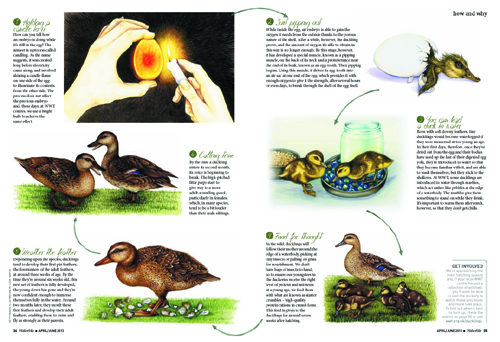
Article for Waterlife Magazine, the magazine of WWT.
Pencil life cycles of insect pests
There were several insect life cycles required for Rodale’s Vegetable Garden Problem Solver by Fern Marshall-Bradley; all the illustrations for this book were pencil and landscape, and since they showed insect pests from the USA it was harder to get good reference. However, I was pleased with the illustrations, and especially pleased with how insane the Mexican beetle’s larva look.


Colorado Potato Beetle Life cycle
Another insect who is asked for often is the colorado potato beetle. This animal is a joy to paint because the larval form is bright orange with black spots, and the adult a glorious striped yellow. I am aware that American potato growers feel very differently about this creature, but I love it.
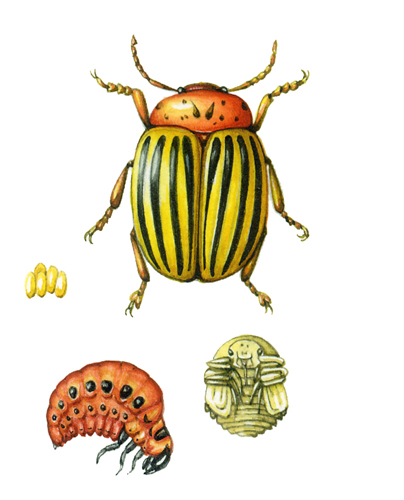
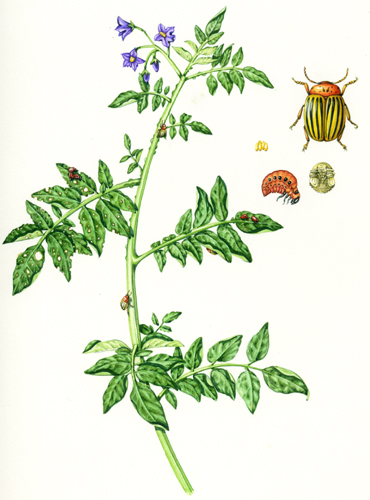
Desert Locust life cycle
Another serious pest to agriculture is the locust. The hardest part about illustrating this animal’s life cycle was depicting the swarming stage, and trying to convey the fact that its only the second generation of locusts that do the swarming behaviour.
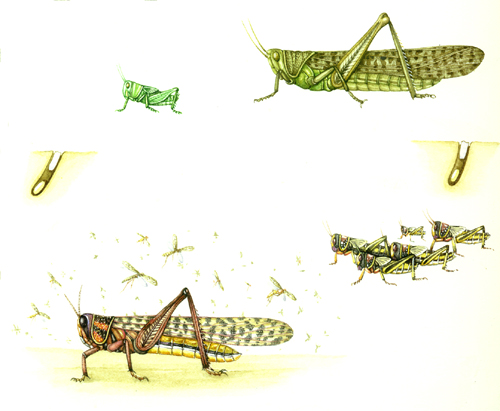
Butterfly life cycles
One of my favourite life cycle illustrations is when I’m asked to do an insect with its host plant. Unsurprisingly, these are often lepidopteran species. I often think how wonderful it is that I’m continuing a tradition that stretches all the way back to Maria Sybilla Meriam, whose phenomenal work, “The Insects of Surinam” saw her not only illustrating but also researching and following through the life cycles of many Asian moths and butterflies.
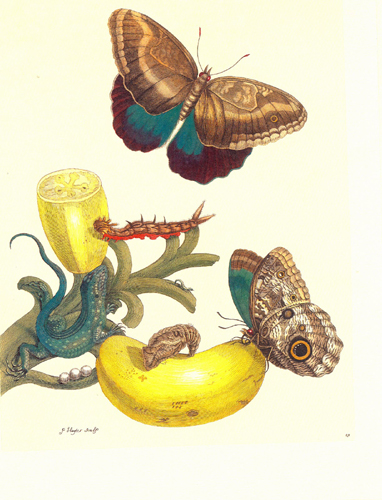
But I digress.

This painted lady life cycle was done for a private commission, and the hardest part was definitely drawing the thistle.
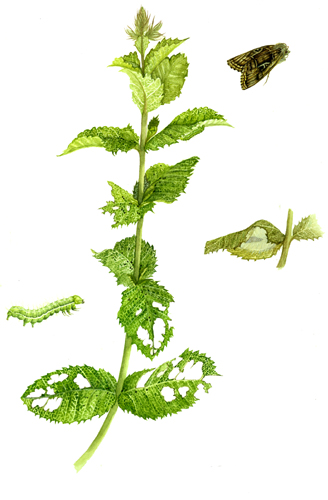
This silver Y moth on apple mint was done when I found a tiny caterpillar in the garden, and raised it to adulthood. It was a real luxury to take the time to work this way, and perhaps when I retire and escape the pressures of earning from my illustrations, I’ll do many more similar projects.
The six spot burnet moth is an incredibly beautiful creature, and right before receiving a comission from BBWOT to illustrate its life cycle I’d been examining its chrysalids, which appear high up on grasses and are very beautiful. They look like they’re made from delicate tissue paper.
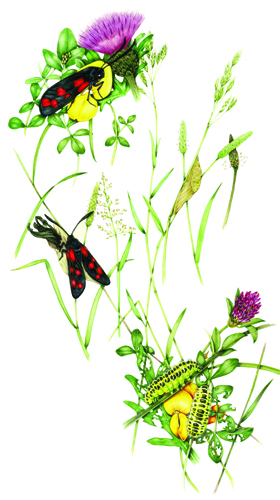
This painting was comissioned as four separate quadrants, but I really wanted the finished piece to work as a whole. Using a template of a quadrant shape, I made sure each of the life cycle stages worked well in that shape, then played with the linking plants to ensure it worked well as a whole. It was selected for Images 36 Best of British Illustration annual and tour, along with a dandelion study.
Damselfly life cycle
One of the hardest of the life cycle paintings I’ve done has to be the whole life cycle of the Large red Damselfly. I have a bit of a thing for Odonata (see my blog “Dragonfly Stamps – a dream job”), so was more than happy to accept the work from BBWOT.
The challenge was to unite the unerwater stages with those of the emerged adult; and to get the details of the emerging adult and nymph form correct.
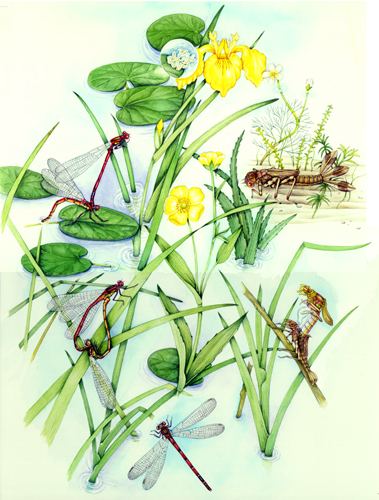
I think the finished piece works well, and conveys something of the busy water’s edge where these animals live.
Although all these illustrations include a great deal more research and thought than a simple cut-to-white illustration of an adult; I rather like them for stretching me, both in terms of my zoological knowledge and my artistic ability. I’d quite like to do some more, for example the life cycle of a common shore crab. Now THERE’S a peculiar one. If you don’t believe me, go on, look it up!

